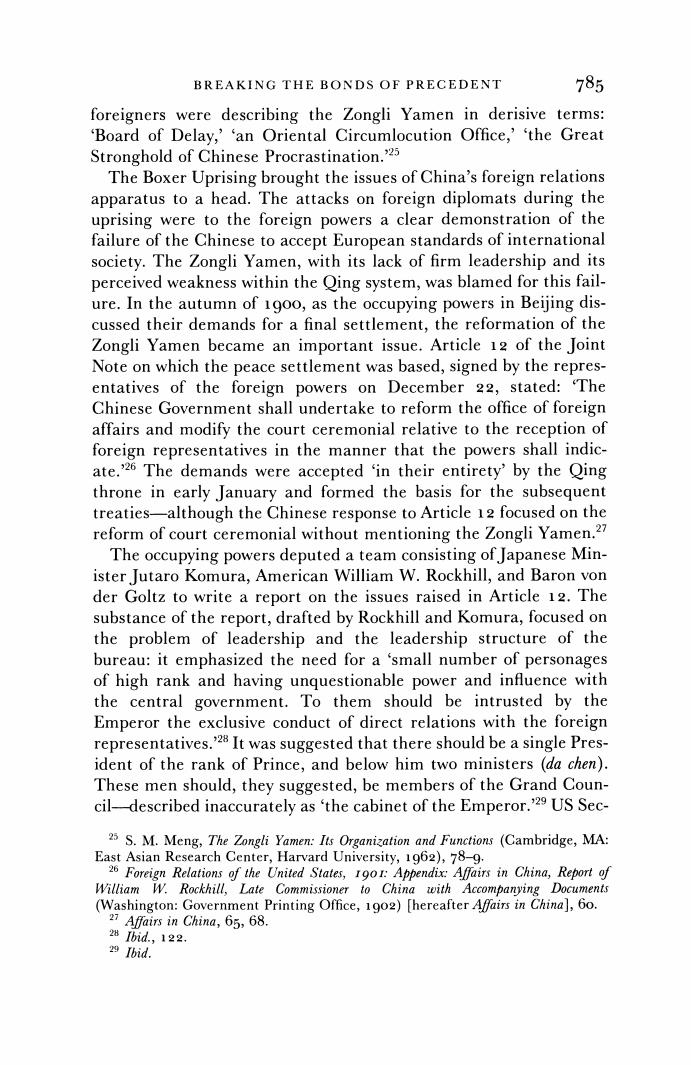正在加载图片...

BREAKING THE BONDS OF PRECEDENT 785 foreigners were describing the Zongli Yamen in derisive terms: 'Board of Delay,'an Oriental Circumlocution Office,'the Great Stronghold of Chinese Procrastination."25 The Boxer Uprising brought the issues of China's foreign relations apparatus to a head.The attacks on foreign diplomats during the uprising were to the foreign powers a clear demonstration of the failure of the Chinese to accept European standards of international society.The Zongli Yamen,with its lack of firm leadership and its perceived weakness within the Qing system,was blamed for this fail- ure.In the autumn of 1g00,as the occupying powers in Beijing dis- cussed their demands for a final settlement,the reformation of the Zongli Yamen became an important issue.Article 12 of the Joint Note on which the peace settlement was based,signed by the repres- entatives of the foreign powers on December 22,stated:The Chinese Government shall undertake to reform the office of foreign affairs and modify the court ceremonial relative to the reception of foreign representatives in the manner that the powers shall indic- ate.26 The demands were accepted in their entirety'by the Qing throne in early January and formed the basis for the subsequent treaties-although the Chinese response to Article 12 focused on the reform of court ceremonial without mentioning the Zongli Yamen.27 The occupying powers deputed a team consisting of Japanese Min- ister Jutaro Komura,American William W.Rockhill,and Baron von der Goltz to write a report on the issues raised in Article 12.The substance of the report,drafted by Rockhill and Komura,focused on the problem of leadership and the leadership structure of the bureau:it emphasized the need for a small number of personages of high rank and having unquestionable power and influence with the central government.To them should be intrusted by the Emperor the exclusive conduct of direct relations with the foreign representatives."28 It was suggested that there should be a single Pres- ident of the rank of Prince,and below him two ministers(da chen). These men should,they suggested,be members of the Grand Coun- cil-described inaccurately as the cabinet of the Emperor.29 US Sec- 2 S.M.Meng,The Zongli Yamen:Its Organization and Functions (Cambridge,MA: East Asian Research Center,Harvard University,1962),78-9. 26 Foreign Relations of the United States,Igor Appendix:Affairs in China,Report of William W.Rockhill,Late Commissioner to China with Accompanying Documents (Washington:Government Printing Office,1902)[hereafter Affairs in China],60. 27 Affairs in China,65,68. 2wbid,122. 2Ibid.BREAKING THE BONDS OF PRECEDENT 785 foreigners were describing the Zongli Yamen in derisive terms: 'Board of Delay,' 'an Oriental Circumlocution Office,' 'the Great Stronghold of Chinese Procrastination.'25 The Boxer Uprising brought the issues of China's foreign relations apparatus to a head. The attacks on foreign diplomats during the uprising were to the foreign powers a clear demonstration of the failure of the Chinese to accept European standards of international society. The Zongli Yamen, with its lack of firm leadership and its perceived weakness within the Qing system, was blamed for this failure. In the autumn of 1900, as the occupying powers in Beijing discussed their demands for a final settlement, the reformation of the Zongli Yamen became an important issue. Article 12 of the Joint Note on which the peace settlement was based, signed by the representatives of the foreign powers on December 22, stated: 'The Chinese Government shall undertake to reform the office of foreign affairs and modify the court ceremonial relative to the reception of foreign representatives in the manner that the powers shall indicate.'26 The demands were accepted 'in their entirety' by the Qing throne in early January and formed the basis for the subsequent treaties-although the Chinese response to Article 12 focused on the reform of court ceremonial without mentioning the Zongli Yamen.27 The occupying powers deputed a team consisting ofJapanese Minister Jutaro Komura, American William W. Rockhill, and Baron von der Goltz to write a report on the issues raised in Article 12. The substance of the report, drafted by Rockhill and Komura, focused on the problem of leadership and the leadership structure of the bureau: it emphasized the need for a 'small number of personages of high rank and having unquestionable power and influence with the central government. To them should be intrusted by the Emperor the exclusive conduct of direct relations with the foreign representatives.'28 It was suggested that there should be a single President of the rank of Prince, and below him two ministers (da chen). These men should, they suggested, be members of the Grand Council-described inaccurately as 'the cabinet of the Emperor.'29 US Sec- 25 S. M. Meng, The Zongli Yamen: Its Organization and Functions (Cambridge, MA: East Asian Research Center, Harvard University, 1962), 78-9. 26 Foreign Relations of the United States, 19or: Appendix: Affairs in China, Report of William W. Rockhill, Late Commissioner to China with Accompanying Documents (Washington: Government Printing Office, 1902) [hereafter Affairs in China], 60. 27 Affairs in China, 65, 68. 28 Ibid., 122. 29 Ibid